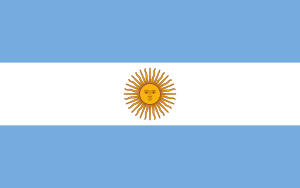Argentinean

|
|
| Total population | |
|---|---|
| (c. 44 million) | |
| Regions with significant populations | |
|
|
|
|
|
291,740 |
|
|
224,952 |
|
|
59,115 |
|
|
53,192 |
|
|
48,312 |
|
|
42,202 |
|
|
22,743 |
|
|
19,210 |
|
|
14,190 |
|
|
13,696 |
|
|
11,899 |
|
|
11,239 |
| Languages | |
|
Spanish (Rioplatense dialect, Cordobés dialect) |
|
| Religion | |
|
|
| Related ethnic groups | |
| Other Latin Americans (primarily Chileans, Uruguayans and Paraguayans) Europeans, Amerindians |
|
Argentines, also known via circumlocution as Argentinians (Spanish: argentinos), are the citizens of the Argentine Republic, or their descendants abroad. Argentina is a multiethnic society, which means that it is home to people of many different ethnic backgrounds. As a result, Argentines do not consider their nationality as an ethnicity but as a citizenship with various ethnicities. Aside from the Indigenous population, nearly all Argentines or their ancestors immigrated within the past five centuries. In fact, among countries in the world that have received the most immigrants in modern history, Argentina, with 6.6 million, ranks second to the United States (27 million), and ahead of other immigrant destinations such as Canada, Brazil, and Australia.
According to the 2010 census [INDEC], Argentina had a population of 40,091,359 inhabitants, of which 1,805,957 or 4.6%, were born abroad. The population growth rate in 2008 was estimated to be 0.917% annually, with a birth rate of 16.32 live births per 1,000 inhabitants and a mortality rate of 7.54 deaths per 1,000 inhabitants.
Argentina's population has long had one of Latin America's lowest growth rates (recently, about one percent a year) and it also enjoys a comparatively low infant mortality rate. Strikingly, though, its fertility rate is still nearly twice as high (2.3 children per woman) as that in Spain or Italy, despite comparable religiosity figures. The median age is approximately 30 years and life expectancy at birth is 76 years.
Argentina is a multiethnic society, which means that it is home to people of many different ethnic backgrounds. As a result, the people there usually treat their nationality as a citizenship, but not an ethnicity. Argentines usually refer to their country as a "crisol de razas" ("crucible of races"), or, a melting pot.
...
Wikipedia
